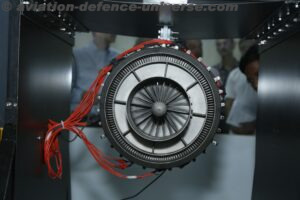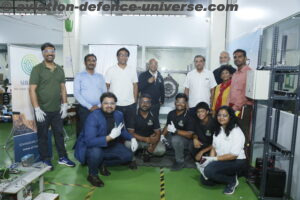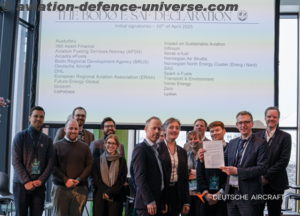 New Delhi & Pune, April 2025: SiriNor, an India and Norway-based deeptech aerospace startup developing the world’s first all-electric jet engine, completed the on-ground test of its proprietary propulsion system in Pune. The milestone validated the engine at Technology Readiness Level 6 (TRL 6) under NASA’s framework, marking a critical step towards full commercialisation. The engine prototype ran successfully in the test rig by not only achieving but surpassing the design intent of 40,000 RPM* and 10 kgf thrust as measured by a load cell. Its scalable architecture supports applications across Unmanned Aerial Vehicles (UAVs), Regional Aircraft, Seaplanes, and Defence Platforms.
New Delhi & Pune, April 2025: SiriNor, an India and Norway-based deeptech aerospace startup developing the world’s first all-electric jet engine, completed the on-ground test of its proprietary propulsion system in Pune. The milestone validated the engine at Technology Readiness Level 6 (TRL 6) under NASA’s framework, marking a critical step towards full commercialisation. The engine prototype ran successfully in the test rig by not only achieving but surpassing the design intent of 40,000 RPM* and 10 kgf thrust as measured by a load cell. Its scalable architecture supports applications across Unmanned Aerial Vehicles (UAVs), Regional Aircraft, Seaplanes, and Defence Platforms.
SiriNor has already raised early-stage funding from Shell E4, Alok B Shriram, and other prominent angel investors. Additionally, seven LOIs have been signed with global UAV, GEV, and small aircraft operators. SiriNor comprises a highly technical team of aerospace engineers, propulsion specialists, and simulation experts from India and Norway, with a commercial background in Fortune 500 companies such as Airbus, Tata Vistara, GE, Pratt & Whitney, Equinor, among others.
Notable attendees included Alok B Shriram, Senior Managing Director and CEO of DCM Shriram Industries Ltd.; Subhrajit Dey, Head of Group Strategy Excellence at Shell and technical advisor to SiriNor; Ravinder Pal Singh, Ex CIO of Vistara, inventor and deeptech investor; Ravi Andrews, ex Head of International Business & Trade at Airbus and currently Managing Partner of MAKMOR; along with other key investors and stakeholders.
 After the TRL6 demonstration, Alok B Shriram said, “We had the fortune of meeting Abhijeet at a startup conference and were deeply impressed by his passion and commitment to building a sustainable electric jet engine. After hearing Abhijeet’s pitch, it was clear to me that this was serious, homegrown technology being developed right here in India. I truly believe this represents the future of aviation, and I’m proud to be part of this journey.”
After the TRL6 demonstration, Alok B Shriram said, “We had the fortune of meeting Abhijeet at a startup conference and were deeply impressed by his passion and commitment to building a sustainable electric jet engine. After hearing Abhijeet’s pitch, it was clear to me that this was serious, homegrown technology being developed right here in India. I truly believe this represents the future of aviation, and I’m proud to be part of this journey.”
According to the European Aviation Environmental Report, aviation’s share of global carbon emissions is projected to increase, reaching approximately 2.5% of total CO2 emissions in 2025. SiriNor will now target UAV engine commercialisation by mid-2026 and certification milestones for larger platforms such as seaplanes and regional aircraft by 2027 and 2030, respectively, with the aim of establishing a strong footprint in the USD 100+ billion global jet engine market by 2030.
“This ground test is not just a technical milestone. It’s a moment of validation for our amazing team and our common vision,” said Ivar Aune, Chairman & CEO of SiriNor. “I’m incredibly proud of our team, who have dedicated five relentless years to reaching this point. Their hard work, perseverance, and never-say-die attitude made this achievement possible. TRL6 is a result of their hard work and a testament to their belief in our mission.”
Built for thrust ranging from 1kN to 90+ kN, with ranges exceeding 4,000km, the power source agnostic engine removes the need for combustion chambers or exotic materials, cutting manufacturing costs by 30% and maintenance by up to 40%. Potential partnerships for component manufacturing and supply chain are already underway with strategic partnerships in Pune, Bangalore, Coimbatore, and Hyderabad.
Abhijeet Inamdar, Cofounder and CEO, SiriNor India, added, “Our engine architecture is designed for flexibility at its core, enabling us to usher in a new era of emission-free, electrified aviation. I’m proud to be part of this transformative journey and to contribute meaningfully to the Make-in-India mission.”































































































































